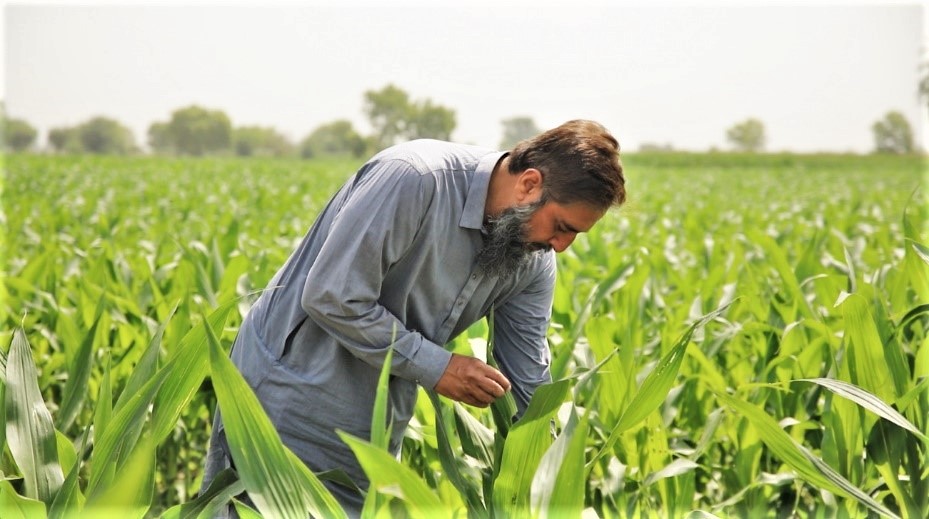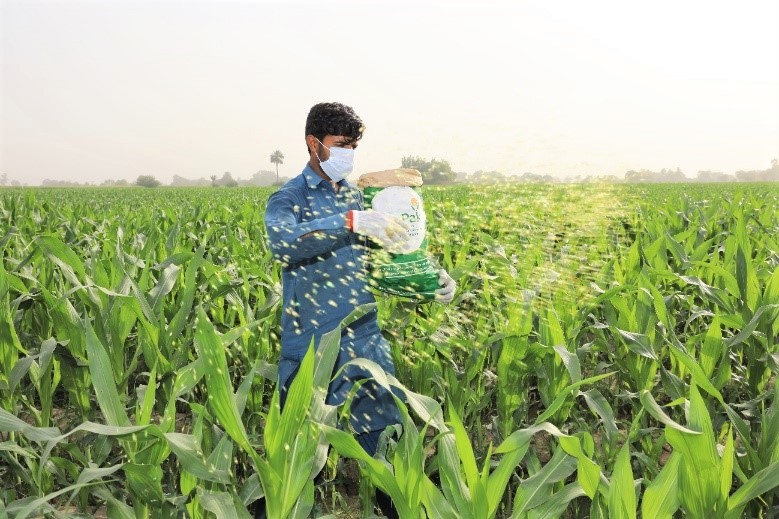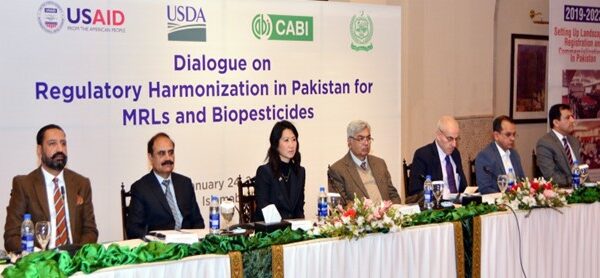
Mian Muhammad Irfan is a maize grower from district Faisalabad in Punjab province. Here Rafhan Maize Products Co. Ltd procures thousands of tons of maize crop each year for processing. He is one of the thousands of maize crop farmers contracted with Rafhan Maize. Mr Irfan grows around one hundred acres of maize annually.
Over the past few years Mr Irfan recalls facing a problem of fungus – which was unknown to him on his maize crop. Initially, he thought this fugus was caused due to climatic factors such as rain as well as poor post-harvest practices being implemented on his farm. These include drying maize on bare land to decrease the moisture contents of the kernel.
However, with the passage of time, this problem has been increasing and his maize consignments were being rejected – causing financial losses to him. On consultation with representatives of the Rafhan Maize team, he came to know about this fungus – Aspergillus flavus which causes aflatoxin contamination of his maize crop. Consumption of contaminated maize leads to harmful effects on human health and livestock. Examples include, where large doses occur, acute liver failure.
In 2018, CABI – along with the scientists from Crop Diseases Research Institute (CDRI), NARC Islamabad and Rafhan Maize Products Co. Ltd – visited MR Irfan’s farm and collected soil samples from maize sown plots. The team also collected samples of maize cobs and soil from the same plots during harvest season. On analysis of the samples, Mr Irfan was informed that A. flavus was present in his soil but that it could be eliminated by applying a biological control product known as AflaPakTM.

Later on, CABI and the Rafhan team organized two awareness sessions on the management of aflatoxin – focusing on the pre-harvest and post-harvest aspect with special reference to biological control in maize crop. The attendees were guided on the benefits of using AflaPakTM and its application strategy for optimum results. After attending these awareness sessions, Mr Irfan remarked that: “By attending these training sessions, I am able to learn some basic knowledge regarding the management of aflatoxins and can share this with other maize growers of my surrounding villages.”
He further added that these awareness sessions were very helpful as CABI and the Rafhan team indicated post-harvest practices – such as technical drying methods – to reduce the kernel moisture. Also, he further learned that the aflatoxin contaminated crops are not only harmful for humans but equally for the health of animals.
Mr Irfan further shared that it is the social responsibility of farming communities to produce healthy commodities with the acceptable level of aflatoxins. This will help the industries to tap into the high-end domestic and international markets which will ultimately result in financial benefits to the farming community.
Mr Irfan also appreciated the efforts of all stakeholders of Aflatoxin Control in Pakistan project including United States Agency for International Development (USAID) and United States Department of Agriculture (USDA) for their assistance in addressing the aflatoxin issue in maize crops in Pakistan.
Additional Information
Main photo: Farmer Mian Irfan monitors the status of his maize crop (Credit: CABI).
Aflatoxin Control Programme
Find out more about CABI’s work on aflatoxin control in Pakistan.
Authors:
Dr Babar E. Bajwa – Project Executive
Dr Sabyan Faris Honey – Project Manager
Contributors:
Dr Hamzah Shahbaz Bhatti – Programme Officer
Dr Muzammil Farooq – Project Officer
Mr Saqib Ali – Communication Assistant
For more information, please contact:
Deborah Hamilton
USDA
202-720-0335
Deborah.Hamilton2@usda.gov
1 Comment
Leave a Reply
Related News & Blogs
Sindh farmer gains global recognition for sustainable cotton farming innovations
Photo credit: Evronas/Better Cotton. Location: Better Cotton Conference, Istanbul, Türkiye, 2024. Sindh farmer Fateh Muhammad Laghari has gained recognition for his commitment to sustainable cotton farming practices as part of the Better Cotton Member…
5 December 2024





Really helpful content. Good job.